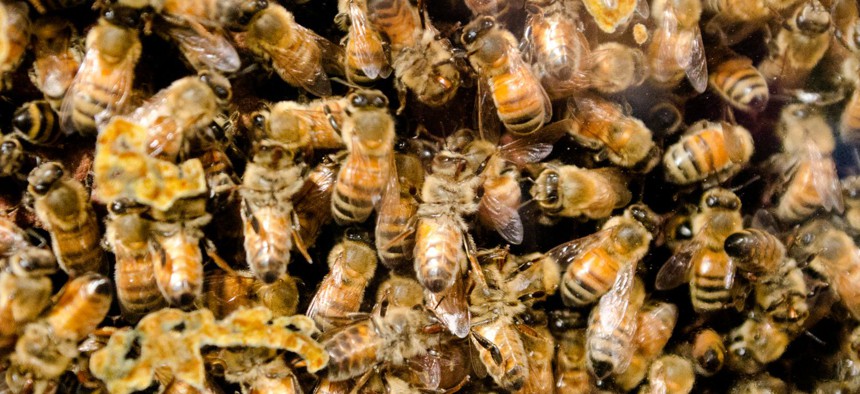Aggressive Bees Go On Rampage in Bay Area; Craft Brewing Won’t Save Alaska

Shutterstock
Also in our State and Local Weekend Digest: Drunken Iowa beachgoers; mysterious Google Maps vehicle in Philly; and New York City toll evaders face Gov. Cuomo’s wrath.
CONCORD, CALIFORNIA
INVASIVE SPECIES | An incident on Friday involving aggressive bees attacking a Northern California beekeeper, his parents, neighbors, pets and a passerby is raising concerns that Africanized bees that have found a home in Southern California have now made their way into the Bay Area. DNA tests are underway to confirm whether the suspicions are true. A strategy to isolate and kill the aggressive bees this weekend didn’t work: “The bees had no central point to focus on, so they spread all over the neighborhood. They’re agitated, out protecting their territory,” said one local beekeeper. [San Francisco Chronicle]
ANCHORAGE, ALASKA
ECONOMIC DEVELOPMENT | Energy-dependent Alaska is trying to diversify its economic base in the face of declining oil prices and a difficult state fiscal outlook. While craft brewing won’t replace oil as Alaska’s primary economic driver, but it could be part of a diversified economic base. A handful of groups with interests in the Last Frontier,’s vitality including the Anchorage Economic Development Corporation and Alaska’s Department of Commerce, Community and Economic Development, are trying to figure out what comes next. [Alaska Dispatch News]
PHILADELPHIA, PENNSYLVANIA
POLICE | Police are investigating a department-owned SUV, not so convincingly masquerading as a Google Maps vehicle. The police SUV was equipped with a front-mounted license plate reader, capable of reading several plates simultaneously within a fraction of a second, and displayed several Google Maps decals. Brandon Worf, who previously worked for a public safety technology sales group, described the reader as “scary efficient.” A Philadelphia police spokesman said “the placing of any particular decal on the vehicle was not approved through any chain of command.” [Motherboard / Vice]
CHICAGO, ILLINOIS
SALARIES | Illinois state workers are the nation’s highest paid, according to an Illinois Policy Institute report. The average annual salary is $59,088, not counting benefits like health insurance and pensions—about $10,000 more than the national average. Current salaries represent a 41 percent increase since 2005, while private sector earnings have remained relatively flat. “Illinois taxpayers simply cannot afford the contract AFSCME is fighting for, and it is wrong to ask everyone to pay more so that a mere .5 percent of the workforce can get another round of raises and benefit increases,” IPI’s policy vice president said. [WAND-TV]
STATEN ISLAND, NEW YORK
TOLLS | The state will suspend 575 registered vehicles belonging to drivers who racked up five toll violations on different days over an 18-month period. "These scofflaws operate at the expense of law abiding toll payers and put additional stress on New York's transportation network without providing any resources to maintain it," Gov. Andrew Cuomo said. "This administration's action stops these toll evaders in their tracks and sends a simple message: If you don't pay your fair share, you will be held accountable." [Staten Island Advance]
HENNEPIN COUNTY, MINNESOTA
MUNICIPAL WASTE | Crews are undertaking a weeklong effort to sort and study nearly two tons of trash to determine what people are throwing away. The goal is to find new ways to reduce waste and recycle more of it at the Hennepin Energy Recovery Center in downtown Minneapolis, a facility that burns about 365,000 tons of garbage each year—turning it into energy. “If we’re going to reduce what we’ve been doing, we have to know what’s in the trash stream,” said County Commissioner Randy Johnson. [Star Tribune]
DES MOINES, IOWA
PARKS AND RECREATION | Although Iowa’s Natural Resources Commission and Gov. Terry Branstad need to weigh in, the Hawkeye State’s Department of Natural Resources wants to pursue an alcohol ban at some state-controlled beaches where public drunkeness has become a big seasonal problem. “The beach went from family time with kids to a bunch of young people drinking, yelling and screaming obscenities, fighting, and people having sex in the water,” said one former park ranger who compared herself to a bar’s bouncer. [Des Moines Register]
FORT SMITH, ARKANSAS
ALCOHOL REGULATIONS | In the Natural State, 35 “dry” counties do not allow retail alcohol sales. Having legal retail alcohol sales is a “a signal of a contemporary economic development environment,” according to a University of Arkansas study. Some of the biggest opponents to dry counties becoming “wet” are alcohol retailers in “wet” states that stand to lose business from customers from dry counties. [Times Record]
BORDEN COUNTY, TEXAS
HANDGUNS | This rural county, located about 300 miles west of Dallas, happens to have the highest per-capita amount of handgun licenses in the Lone Star State. Of the 652 people living there, 108, or upwards of 16 percent of the local population, are licensed to carry. As of April 30, more than 1 million Texans have active handgun licenses. The Houston Chronicle broke down where license holders live by ZIP code and county. [Houston Chronicle]





